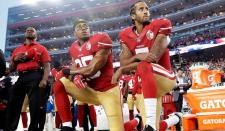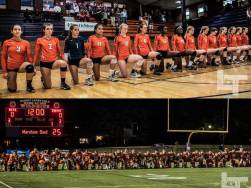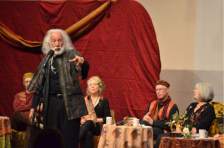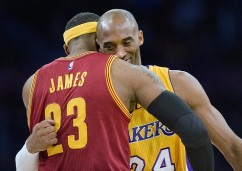I’ve been a sports fan my whole life. As an adult I coached little league and played softball and volleyball for 25 years. I used to love to go to baseball games. I don’t anymore. I used to have very good season tickets to major college basketball. I’ve given them up.
Oh, I still watch the Warriors and Red Sox on TV. Fortunately, I can mute the commercials and those horrible network announcers who never stop yacking. But even if I could afford decent tickets, I can’t go to live games any more.
Perhaps I’m wrong, but for most of my life standing during the playing of the National Anthem was a rote ritual that never seemed to be anything other than an uncomfortable prelude to the real business of the day: re-creating the ancient experience of rooting for your tribe, identifying with your heroes, fantasizing about being a player yourself, and drinking beer in the sun. The announcer would ask everyone to “please stand for the playing of the national anthem,” and everyone would do so, fidgeting, looking around, munching their hot dogs, waiting for the actual ritual announcement: “Play ball!”
Later, watching basketball at Stanford’s Maples Pavilion, I could barely tolerate the noise level. The management had begun to play rock music during basketball timeouts, so loud that I couldn’t converse with the person next to me. The broader spectacle of entertainment had become more important than the game itself.
By those years, I had begun to remain in my seat during the national anthem, and I sometimes got in trouble for my refusal. To be honest, I enjoyed being a provocateur. Call me a curmudgeon, but I was there to watch sports, not for casual, sound-bite conversation – and certainly, as I sometimes had to explain, not to participate in nationalist rituals.
A few times, irritated Stanford alums would advise me to “show respect for the flag.” Had there been any break in the deafening music, I might have replied: “Show respect to whom? The flag, an inanimate object? To you? Show you that I’m a member of your tribe, so as to lower your discomfort?”
After 9/11/2001 those rituals became increasingly militaristic, as anyone who still endures the pre-game spectacles at pro football and basketball games – and the Superbowl – knows. 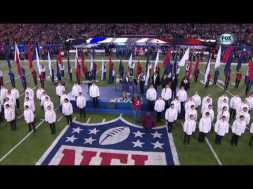 This is the period when the Defense Department was beginning to pay over $50 million to pro sports teams for patriotic displays and tributes to the troops.
This is the period when the Defense Department was beginning to pay over $50 million to pro sports teams for patriotic displays and tributes to the troops.
Since that watershed event, as William Astore writes, “…sports and the military have become increasingly fused in this country:”
Professional athletes now consider it perfectly natural to don uniforms that feature camouflage patterns. (They do this, teams say, as a form of “military appreciation.”) Indeed, for only $39.99 you, too, can buy your own Major League Baseball-sanctioned camo cap at MLB’s official site. And then, of course, you can use that cap in any stadium to shade your eyes as you watch flyovers, parades, reunions of service members returning from our country’s war zones and their families, and a multitude of other increasingly militarized ceremonies that celebrate both veterans and troops in uniform at sports stadiums across what, in the post-9/11 years, has come to be known as “the homeland.” These days, you can hardly miss moments when, for instance, playing fields are covered with gigantic American flags, often unfurled and held either by scores of military personnel or civilian defense contractors.
By 2008 the Maples PA announcer had upped the ante with very specific instructions: “Please stand and remove your hats to honor Americaduring the playing of the national anthem.” Dozens of people in the crowd would sing along, with hands over their hearts. This, mind you, was in the liberal San Francisco Bay Area, not in a conservative Red state. They were showing respect – to each other.
At that point the discomfort level overcame both my enjoyment and my mythologist’s detachment. Call me judgmental, oversensitive. I’m guilty as charged: I can no longer compartmentalize my feelings in the America of drone bombings, police murders, mass incarceration, homeless vets, voter suppression, lead-filled water pipes and incarcerated infants.
Some friends tell me that they honor “what the flag stands for.” My response: Bullshit. The flag now symbolizes nothing more than the national security state and the absolute necessity of periodically sacrificing both its scapegoats on the streets and its own children on battlefields, as I wrote here.
I can still enjoy watching on TV, thanks to that precious mute button and the ability to get up and do other things when even the silenced images are too disturbing. Really, man, I just want a little entertainment after a long day.
You might be surprised to know that the custom of playing the national anthem began only during World War Two. Actually, it’s been even longer – eighty years – that fans have been singing “Take Me Out to the Ball Game” in the seventh inning. 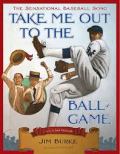 Now that’s a happy custom, pure corn, with only the vaguest of nationalistic implications. (By the way, Americans, uniquely, call themselves “patriots” rather than “nationalists.” I prefer the more accurate term). People stood up and stretched because they wanted to, not because they didn’t want to look out of place.
Now that’s a happy custom, pure corn, with only the vaguest of nationalistic implications. (By the way, Americans, uniquely, call themselves “patriots” rather than “nationalists.” I prefer the more accurate term). People stood up and stretched because they wanted to, not because they didn’t want to look out of place.
But, again, 9/11 served as a wakeup call – to the nation’s gatekeepers, who perceived the necessity of shoring up the cracks in the myth of American innocence wherever they might have been appearing, including sports venues. Some bastard had the bright idea of singing “America the Beautiful” in the first half of the seventh inning, ahead of “Take Me Out,” and he was copied everywhere.
Once a baseball tradition is modified, it is nearly impossible to remove the new addition. And so (for me) the seventh inning stretch has become as annoying as those “Please stand” directives, and implicitly an opportunity to go to the bathroom, or simply to stay home.
It’s all summed up in this post-9/11 phenomenon, which is rapidly being cemented as a permanent aspect of the baseball experience: 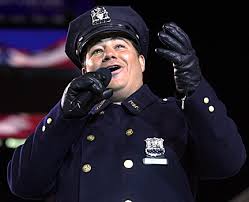 a uniformed policeman or service member, preferably disabled, singing the anthem. This is highly charged symbolic imagery, with multiple levels of meaning:
a uniformed policeman or service member, preferably disabled, singing the anthem. This is highly charged symbolic imagery, with multiple levels of meaning:
1 – First responders. Since 9/11 it has become customary to honor those public servants who do live up to their job titles, many of whom were themselves victims that day. These were true heroes who sacrificed themselves for the greater good in a time when neither politicians nor preachers seem trustworthy any more. And they continue to bear the brunt of that tragedy, as hundreds die early of toxic-induced diseases. And second responders: Thank you for your service, as we deny you decent health coverage.
2 – Public order and safety in a time of fear. For older generations, those most susceptible to the Republican fear-mongering, the police uniform is reassuring. And his singing talent humanizes him. He’s the old-fashioned (white) Irish-tenor beat cop – Officer O’Reilly – of a hundred films, who helps old ladies cross the street, brings cats down from tree limbs and never resorts to any weapon more lethal than his billy-club.
3 – The Hangman. Sadly, as I argued in my blog series Hands Up – Don’t Shoot: The Sacrifice of American Dionysus, he has become the sanctioned state executioner, given regular permission to terminate with extreme prejudice any African-American or Latino male he encounters. In dozens of Fergusons around the country he has been enacting the old rituals of human sacrifice.
Perhaps you think I exaggerate. Since I first wrote this series, I’ve come across two new links. If you choose to watch “Police Gone Wild: Domestic Terrorist Edition,” please understand that these men are enacting our myths for us. Then read “Whistleblower Cop: Fellow Officers Getting ‘Gang Tattoos’ To Celebrate Their Shooting Victims” and understand that they know full well how rarely we punish them, because we have asked them to behave the way they do.
Ask any African-American if this is something new. Ask yourself what sport in America is really about. Fifty-five years ago, in Soul On Ice, Eldridge Cleaver saw that when all Americans secretly subscribe to the notion of “every man for himself:”
…the weak are seen as the natural and just prey of the strong. But since this dark principle violates our democratic ideals…we force it underground …spectator sports are geared to disguise, while affording expression to, the acting out in elaborate pageantry of the myth of the fittest in the process of surviving.

